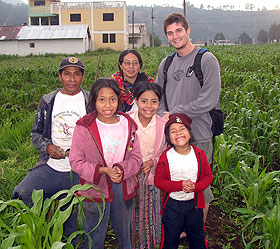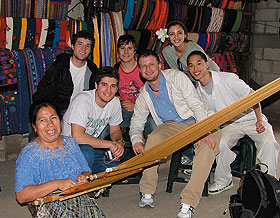  |
| HOME | THIS ISSUE | CALENDAR | GRANTS | BACK ISSUES | < BACK | NEXT > |
Students spend summer working with entrepreneurs in Guatemala by Sherry Fisher - September 2, 2008 | ||||||
| Max Chanoch wanted to make a difference this summer. He did just that during a Study Abroad program, where he helped local Guatemalan entrepreneurs. Chanoch and nine other UConn students conducted eye exams and sold reading glasses to Guatemalan women who weave for their livelihoods; educated people about the benefits of water filters; and demonstrated how wood stoves are safer and more economical than cooking over an open fire, during an eight-week Study Abroad program in social entrepreneurship. The students worked with local entrepreneurs and honed their skills at analyzing rural economic development models and practices. They also studied Spanish. “It was a life-changing experience,” says Chanoch, who is majoring in business management. “You learn about culture and a lot about people and how they live.”
The program is run by the Social Entrepreneur Corps, an organization that offers opportunities for university students to have hands-on learning experiences focused on solutions to community problems. The program was sponsored by UConn’s Study Abroad office, the School of Business, and the Honors Program in consultation with the Spanish section of the Department of Modern and Classical Languages, and led by Professor Linda Klein, associate dean of the School of Business. “The program is part of our goal to give our students broader exposure to world issues,” says Klein. “I believe it’s important for School of Business students to understand the positive impact of business on people’s lives.” Students spent the first two weeks living in the homes of Guatemalans, in rural, traditional communities outside Antigua. Most of the host families did not speak English. The students studied Spanish for four hours each morning, and spent afternoons in academic sessions discussing topics including the difference between relief and development, and the basics of entrepreneurship. For the last six weeks, they were divided into four groups (along with students from Duke, Columbia, Notre Dame, and the University of North Carolina, who were also participating in the program) and worked in four different rural areas on “campaigns” or projects run by local entrepreneurs, mostly women. The primary focus of the campaigns was vision projects, where free vision screenings were offered, and reading glasses were sold.
“Many women weave for their livelihoods, but have no access to glasses,” says Klein.“As they reach their peak production years, their eyesight starts to fail, and they can no longer work. Reading glasses extend their productive years.” Ricky Bogart, a management major, says, “We facilitated the process and helped out as much as we could with the projects, including publicity. We also brought energy-efficient light bulbs, seeds, water purifiers, and stoves. Once they come to the campaigns for the free eye exams, we also try to educate them about these other projects – how they will benefit them, and how they pay for themselves in the long run.” Bogert says the experience will help him in his career. “I want to get into international development, and there’s a lot you can’t learn in books and classes,” he says. “You have to be out in the field to see what works and what methods don’t work, and how to make an organization sustainable. A lot of people were surprised at how involved we actually were with the process. I learned a lot of things I’ll be able to apply in the future.” Kevin Bahr, an economics major, says, “The experience gave me an opportunity to see concepts in action. We offered people products with economic and social benefits. The water filters, for example, have had a huge impact on the people. They save them money because they don’t have to buy bottled water.” Ross Lewin, director of UConn Study Abroad, says the program is “one of the most important Study Abroad initiatives at UConn because it really makes an impact on the lives of poor people. "UConn Social Entrepreneurship is an example of UConn students engaged in the improvement of communities beyond our local, state, or national borders. They have truly exemplified the practice of global citizenship.” Klein adds, “From the business perspective, it gives our students hands-on experiential learning that blends the academic with application.” On Oct. 6 students who participated in the social entrepreneurship Study Abroad will present a symposium about their experience. The event will take place at 6:30 p.m., in the School of Business, Room 211. Refreshments will be served. |
| ADVANCE HOME UCONN HOME |


